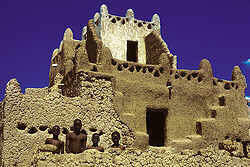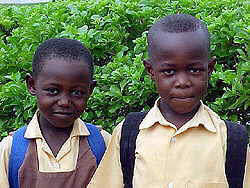 PEOPLE PEOPLE |
VIDEO:
PARTY IN CAPE COAST
People in Ghana really know how to enjoy their
free time. Dancing and playing music in the
street is very frequent in this country.
 VIEW
VIDEO
VIEW
VIDEO
(532KB. Windows Media 9 series.)
 |
 OFFICIAL
LANGUAGE OFFICIAL
LANGUAGE
The official language of Ghana is English. Ghana’s principal ethnic groups are the Akan (Twi and Fante speaking) the Guans, Ewes, Dagombas, Gas, Gonjas, Dagabas, Walas and Frafras.
There are 56 Ghanaian dialects of which Akwapem, Twi, Asante Twi, Fante, Dangbe, Ewe, Kasem, Gonja, Dagara, Ga, Dagbani and Nzema are Major languages.
Most Ghanaians descended from migrating tribes that probably came down the Volta River valley at the beginning if the 13th Century.
Ethnically Ghana is divided into small groups speaking more than 50 languages and dialects, a few of which have been mentioned above.
 POPULATION POPULATION
Ghana’s population of about 19.5million is concentrated along the coast and in the principal cities of Accra and Kumasi.
Repartition in the country:
| Region | Capital | Size (km2) | Population | | Greater Accra | Accra | 2,592 | 4 m | | Ashanti | Kumasi | 24,389 | 3 m | | Eastern | Koforidua | 24,389 | 2.5m | | Central | Cape Coast | 9,826 | 2m | | Volta | Ho | 20,570 | 1.5m | | Western | Sekondo-Takoradi | 23,921 | 1.5m | | Brong Ahafo | Sunyani | 39,557 | 2m | | Northern | Tamale | 70,384 | 1.9m | | Upper East | Bolgatanga | 8,942 | 1 m | | Upper West | Wa | 18,376 | 0.8m |

 RELIGION RELIGION
Religion is deep-rooted in Ghanaian culture and plays a major role in the principles of everyday life. Almost everything done is attached to the religious beliefs of the people: working, dancing, travelling and also eating and drinking. Life before and after death also only makes sense in the religious context. Just as anywhere else in the world, religion in Ghana is based on beliefs and rituals, the centre of which is God. This God has a different name according to the religion. This god has power over life and death.
Next to God are the ancestors who also play a very
important role in the Ghanaian traditional religions.
Finally, you have the super-natural powers or lesser
gods who obtain their power from God. |
Some of these super-natural powers are worshiped through nature such as, trees, rivers, mountains and so on; but these are not identical with the Gods, they only live through them. All these together explain the deep respect that the Ghanaian generally has for nature. Religion binds the people to the living in society and to those who are dead and gone. Religion keeps families together, keeps the tribes together. Religion on the whole keeps the Ghanaian culture alive. There are many different types of Christian churches in Ghana, such as Muslims, Buddhists and other religions, too.
The Ghanaian's religious nature makes it possible for all to live and practice what they believe in respect and harmony. Ghana is predominantly a Christian country, with Christians constituting 35%, Muslims 27%, indigenous beliefs 31% and others constituting 7%.
 EDUCATION EDUCATION

There are 9 years of compulsory education. Ghana’s literacy rate ranges around 64.5%. There are numerous educational institutions throughout Ghana varying from, 12000 primary schools to over 20 higher educational institutions, including 5 universities.
Primary and junior school is tuition-free and mandatory. The Government of Ghana’s support for basic education is equivocal. Article 39 of the constitution, mandates the major tenets of the free, compulsory, universal basic education (FCUBE).
The FCUBE (Free Compulsory Universal Basic Education), launched in 1996 is one of the most ambitions pre-tertiary education programmes in West Africa.
Since 1987, the Government of Ghana has increased its education budget by 700%, with basic education’s share, growing from 45% to 60% of that total.
There are three levels of education in Ghana: first and second cycles, and the tertiary level. A six-year primary school system has been put in place to prepare for a three-year junior secondary school curriculum. With aptitude a pupil advances to a senior secondary school that lasts three years. The curriculum for J.S.S. includes academic courses a well as pre-technical and pre-vocational ones. About 50% of those who complete the J.S.S. and enter Senior Secondary School, 25% later enter tertiary institutions which consist of all post-secondary, training, nursing, banking, agriculture, polytechnics and uiversities.
As mentioned previously, Ghana’s main universities are:
1) The University of Ghana-Legon-Accra, founded 1948
2) The Kwame Nkrumah University of Science & Technology, Kumasi, founded 1961
3) University of Cape Coast, founded 1962
4) University College of Education, World Investment News Ltdba, founded 1992
5) University of Development Studies, Tamale, founded 1993. |

